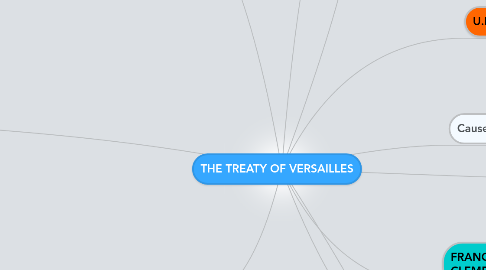THE TREATY OF VERSAILLES
da Fernando B.

1. GERMANY'S REACTIONS TO THE TREATY
1.1. Germany was to lose: 10 percent of its land All of its overseas colonies 12.5 percent of its population 16 percent of its coalfield and iron/ steel industry.
1.2. War guilt
1.2.1. The Germans felt that the blame should be shared.
1.2.2. They feared that the reparations would cripple them.
1.3. Disarmament
1.3.1. 100,000 men was a very small army, Germany's army was a sign of their pride.
1.4. Territories
1.4.1. The loss of territories was a major blow to the German pride.
1.4.2. The Saar and Upper Silesia were good industrial areas.
1.4.3. The French and the British both started to take over the German colonies.
2. THE TERMS OF THE TREATY (BRAT)
2.1. Blame
2.1.1. The Germans viewed this as extremely harsh and had to accept the blame for the war.
2.2. Reparations
2.2.1. They all eventually agreed that Germany had to pay for the damage.
2.2.2. In 1921 the figure sat at 66oo million pounds that Germany didn't finish paying till 1984.
2.3. Army
2.3.1. The army was limited to 100,000 men.
2.3.2. Conscription was banned all, soldiers had to be volunteers.
2.3.3. They were not allowed submarines and aircrafts.
2.3.4. They were only allowed 6 battle ships.
2.3.5. The Rhineland was banned from them.
2.4. Territories and colonies
2.4.1. Germany's overseas empire was taken away.
3. MAIN
3.1. Militarism: Army Reduction; for all treaties!
3.2. Alliancea: All alliances broken and LegOfNat forbid secret alliances
3.3. Imperialism: All German Colonies were lost and Britain an France took them.
3.4. Nationalism: Other countries were made to fell inferior to the other countries!; Only losers got punished!
4. Pros: It officially brought about peace in the region. Its territorial provisions were mild compared to what Germany could have imposed on Europe if the country came out victorious. It provided certain guarantees to Germany. It enforced disarmament. It compensated the war debts of the Allies.
5. Cons: It wrongfully enforced Germany to accept responsibility for the war. It was too harsh to be effective. It imposed the Carthaginian peace. It did not involve anyone else. It was not fully enforced.
6. USA (WOODROW WILSON)
6.1. From USA, he wanted to build peace from the ruins of war
6.2. He believed that punishment should not be harsh, or they would fight back when they were strong
6.3. He established the 14 points and the most important one was the LEAGUE OF NATIONS
6.4. He also believed in self determination. where nations should be ruled by themselves.
6.5. Many people disagreed with the 14 points. They generally said: Peace, little armies, League o Nations, No secret alliances, etc.
7. THE PARIS PEACE CONFERENCE
7.1. It lasted for 12 months
7.2. There were treaties, drawn up one of the main was the Treaty of Versailles which dealt with Germany.
8. U.K (LYOYD GEORGE)
8.1. From England, he was in the middle of France and USA with the decision to destroy Germany.
8.2. George wanted Germany to be punished justly, he wanted Germany to lose its colonies, and the navy, as it was a threat to England.
8.3. He wanted to start trading with Germany again.
9. FRANCE (GEORGES CLEMENCEAU)
9.1. From France, they suffered the most damage to land, people, industry and self confidence.
9.2. The French President wanted Germany to be broken up into smaller state,s but he knew that the other leaders wouldn't agree
9.3. He wanted the treaty to weaken Germany as much as possible.
10. A Carthaginian peace; crush opponent to make peace.
11. Causes of Harsh Treaty
11.1. Crippling Germany allowed for a rise of radical parties such as Nazis to rise in Germany! Indirectly caused WWII!


